I am often asked that one leadership style that I adhere to. The truth is that it is not so much a style but rather a ‘mantra’ that I choose to live by. The mantra is “I strive to make my workplace safe to fail for my colleagues all the while ensuring that they have all the tools in their armory to enable them to succeed”.
Rohit Manucha

Now let us deconstruct what this means. Have you ever gone into an interview wherein you have been asked “Tell me about a time when you failed and what did you learn from it”? In this case, the focus of your response should ideally not be so much on the ‘failure incident’ but more to do with how you dealt with and overcame it.
Similarly, by ‘making workplace safe to fail’, I attempt to do away with demonizing failure. After all, failure is a stepping stone to success as Thomas Alva Edison once said, “I did not fail, I’ve just found 10,000 ways that won’t work”.
The focus thus, for me is: “what have we learned from this?”. In any successful career path, “learning-unlearning-relearning” are the 3 pillars of growth. Simply put, this is my colleagues’ learning experience and they need to own it, without the stress of repercussions. After all, multiple studies have shown that organizations that thrive and not just survive are those that enable such “learning opportunities” for their employees.
The next aspect of this ‘mantra’ is providing all the tools to enable them to succeed by incorporating design thinking and creating an amazing employee experience. Take a page from Sun Tzu’s “The Art of War” where mere a finite number of situations create multiple options by creating combinations. Similarly, siloed thinking in organizations needs to be done away with and replaced truly with being like ‘water’ – flexible, quick, formless yet formidable force.
So, if I was to ask you how you would succeed in your job the answer to you is obvious…after all, you have thought about it at least a thousand times, wishing if only you were given the ‘freedom to act on it. Well, this is just that – the freedom, which you have been craving for after all is it not the role of the manager to ‘serve’ the team and provide for them. Similarly, how else will a true leader instill inspiration amongst the forces, drive change management initiatives if such a leader is not trusted, respected, and revered by the team? So how do you win these three? Simple – by serving, thus be a ‘servant leader’.
So, ask yourself who in this multigenerational workforce spanning across five generations, should be making the moves for the future (experience vs experience biases)? What has the future of work in store for us? Honestly, speaking it’s a bit rich speaking of the future taking the tools of today however if history has taught us anything that is that the future is ‘promising’. So, what are those current-day prejudices continuing under the garb of practices that need to evolve?
WORK FROM OFFICE – It is not only about the ongoing Covid-19 pandemic alone, but with current technological advancements working from anywhere should be a norm. However, organizational culture and structure/ process transformation and the respective country’s tax, nationality laws would need to keep pace with this to truly allow for a seamless remote working experience;
5/6-DAY WORK WEEK – With the aforementioned point on technology, even our productivity levels have advanced to the level to allow for at the very least experimenting with 4-day work weeks, flexi-time, and even lesser than the 8-hour work patterns. So, who are we following with this 8-hour work when our attention spans have regressed over the last two decades to be lower than a goldfish as of today?
BOUNDED EMPLOYMENT CONTRACTS – Is it not ironic that those at minimum wages are forced to hold down more than two jobs on an average to make ends meet whereas for a huge chunk of the workforce they are required to be ‘bounded’ to one employer at a time. Hence, for all you know this may be the key to the utopia construct of ‘wealth redistribution, is then freelancing the future or the disorganized entrepreneurial past we are heading back to before the advent of organized institutions? Also, if job security is not guaranteed, then how is job loyalty expected? Is this the reason that ‘the great layoff’ of 2020 gave way to ‘the great resignation’ of 2021?
But I am a realist and I recognize that the future is not a point and time but rather a journey along a timeline, and each organization’s present state along this time lime could be plotted at very rudimentary levels thereby making their evolutionary catch up equally difficult…but then again who said anything about incremental jumps not being allowed. So, I realize this probably deserves a write-up, so stay tuned for this in the next edition of this magazine.
Rohit Manucha is Chartered Chartered FCIPD, SHRM accredited Senior Certified Professional, ICF, CTA and EMCC accredited Coach. He is a Board Member of CHRO.



